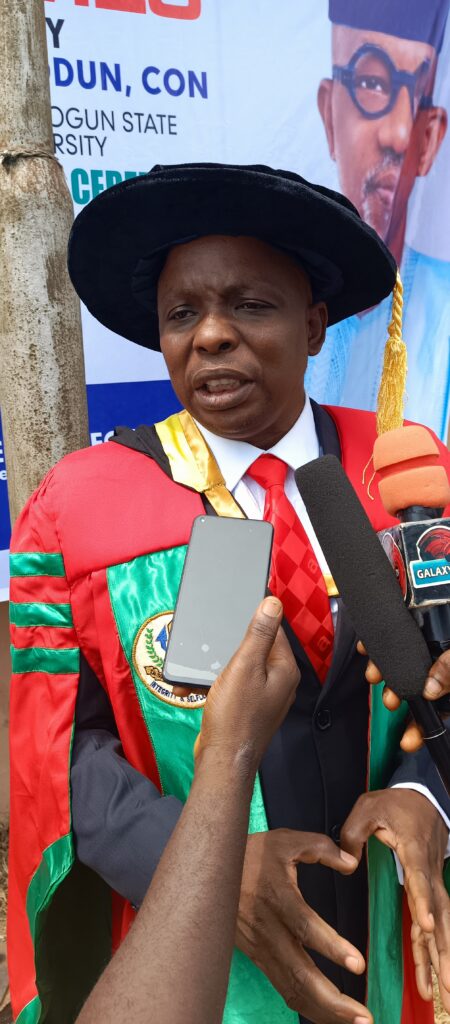In this interview, the Honourable Federal Commissioner representing Ogun state in the National Population Commission and a former lawmaker that represented Ijebu North East State Constituency in the Ogun State Assembly between 2019 and 2023, Otunba Fashuwa Abayomi, popularly known as Yomi-FAJ recently bagged PhD in Geography with special focus on Climate Change and River basins management from Tai Solarin University of Education, Ijagun, Ogun State, shares insights into his academic journey, the challenges of combating climate change, and the implications for Nigeria’s development.
He spoke with DAUD OLATUNJI, Editor, PLATFORM TIMES at the 16th convocation ceremony held by TASUED, urging the government to take the issue of climate change seriously.
Today you earned your PhD. How do you feel about this achievement?
Today is a good day. I feel very elated because it has been a turbulent journey. But we thank God for the grace to achieve this milestone.
What is the focus of your studies?
I earned a PhD in Geography with a specialty in Climate Change.
Considering global climate issues, how relevant is your field to Nigeria?
The relevance is immense. The reason I chose this field is to contribute to Nigeria. The effects of climate change globally have been enormous, and its impact on my people has been severe, particularly on our water reservoirs and dams. My research examines why these changes are happening and how climate change affects them. I believe this knowledge will aid in planning for our river basins, which are vital to agriculture — the mainstay of our economy.
Do you think Nigeria’s river basins are fulfilling their purpose?
The river basins are doing their best, but the way climate change is impacting these systems is significant. Without studying and understanding these impacts, we won’t be able to plan effectively for the future. My study provides baseline information that can be used for strategic planning.
What were some of the findings from your research?
We discovered that the impact of climate change on river basins is more severe than anticipated. There’s an urgent need to incorporate the findings of these studies into planning. Otherwise, we risk ending up in a cul-de-sac where the water quantities in our river basins are insufficient for necessary activities.
What advice would you give the government regarding river basins?
River basins should serve as a foundation for planning. More emphasis should be placed on research to ensure water quality is maintained over time. The government should allocate more funding to research rather than focusing solely on scattered projects. The primary purpose of establishing river basins is for strategic planning, and that should be their priority.
Are you concerned about the effects of climate change in Nigeria?
Yes, all of us are very worried. That’s why we need to commit more funds and energy to combating climate change. Adaptation strategies and mitigation efforts are crucial. If we don’t act urgently, the results may not be palatable.
What is your advice to farmers?
Farmers need to adopt climate-smart strategies to curb the effects of climate change. If they fail to do so, they won’t thrive in the future.
And to the government?
Climate change is real, and its impacts are evident in Nigeria. The government needs to put more effort into combating it. At the recent UN gathering, COP29, climate change was a major topic. Nigeria should align with global efforts and focus on addressing these challenges because climate change affects everything we do. If we’re not serious about this, we’ll be left behind.
There was a recent proposal involving $500 million for climate change efforts at COP29. Do you think it’s excessive?
How can it be excessive? It’s about saving the world. Climate change financing is critical; without it, we’re not safeguarding our planet. The effects are already evident globally and in Nigeria — from crops drying up to water bodies shrinking. Nigeria needs to wake up and align with climate change financing efforts.
How long did it take you to complete your PhD?
We started in late 2019, so it took about four to five years.
How would you describe the journey? Was it easy?
It was very rigorous. Balancing my work as a politician with my studies made it even more challenging. When I was voted in as an assembly member, I had to manage both responsibilities. Despite the challenges, we thank God for making it possible.
Do you want to share a story with us? Do you want to advertise with us? Do you need publicity for a product, service, or event? Contact us on WhatsApp +2348183319097 Email: platformtimes@gmail.com
We are committed to impactful investigative journalism for human interest and social justice. Your donation will help us tell more stories. Kindly donate any amount HERE




